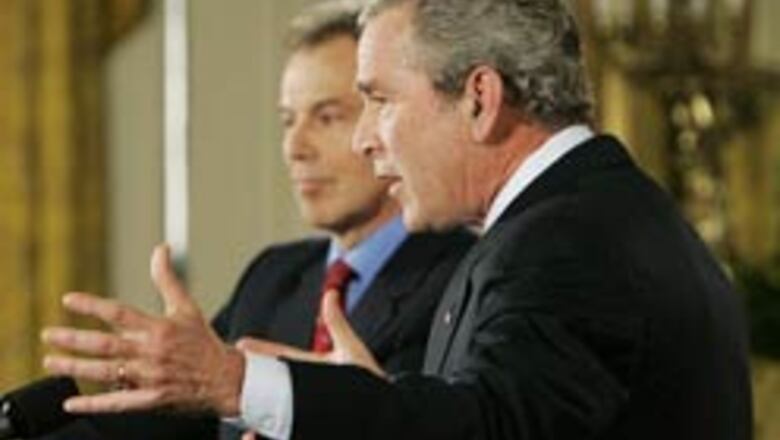
views
Washington: More than three years after sending their troops to invade Iraq, President George W. Bush and British Prime Minister Tony Blair cannot escape questions about their decision to go to war even as they acknowledge far-reaching mistakes.
Defensive when they would prefer to celebrate the recent political success in Baghdad, the trans-Atlantic allies reflected on the price of bringing freedom to Iraq.
In a joint news conference on Thursday night that had a somber tone, Bush acknowledged that bloodshed has been difficult for the world to understand. Blair called the violence ''ghastly.''
But, Bush said at the White House, ''Despite setbacks and missteps, I strongly believe we did and are doing the right thing.''
Those missteps include the abuse of Iraqi prisoners at Abu Ghraib, though Bush pointed out that those responsible have been jailed. More personally, the president said, he learned not to use so much "tough talk"—saying Osama bin Laden was wanted "dead or alive" and challenging America's enemies to "bring it on."
"I learned some lessons about expressing myself maybe in a little more sophisticated manner, you know," Bush said softly.
Blair said the leaders did not accurately predict immense challenges such as the strength of the insurgency. "It should have been very obvious to us," the Prime Minister said.
The press conference came after Bush and Blair had a private meeting and ended when the two left for dinner upstairs in the president's residence.
Blair was continuing his Washington visit Friday with a speech at Georgetown University and a private lunch with Bush before heading home.
Blair briefed the president on his discussions in Baghdad on Monday with Iraqi Prime Minister Nouri al-Maliki, who said his forces are capable of taking control of security in all provinces within 18 months. Iraq's new government was installed last week.
PAGE_BREAK
"I think it's possible to happen in the way that Prime Minister Maliki said," Blair said. "For that to happen, obviously, the first thing that we need is a strong government in Baghdad that is prepared to enforce its writ throughout the country. My very strong feeling, having talked to the leaders there, is that they intend theirs to be such a government."
Neither Bush nor Blair would give specifics on when soldiers from their countries can begin to go home.
"We're going to work with our partners in Iraq, the new government, to determine the way forward," Bush said. He said the goal remains "an Iraq that can govern itself and sustain itself and defend itself."
He said one problem was the lack of an Iraqi defense minister, and he urged al-Maliki to fill the post soon.
Bush declined to discuss news reports that the Pentagon hoped that the U.S. force, now at 131,000 troops, could be reduced to about 100,000 by year's end.
"We'll keep the force level there necessary to win," Bush said.
Britain has about 8,000 troops in Iraq. Blair said the goal remains that Iraqi security forces could "take control progressively of their own country."
On another topic high on the agenda, neither Bush nor Blair would reveal his thinking on possible incentives to draw Iran back to negotiations over its suspected nuclear weapons program.
"Of course, we'll look at all options. But it's their choice right now--they're the ones who walked away from the table," Bush said. "I think we ought to be continuing to work on ways to make it clear to them that they will be isolated."
Bush was dismissive of recent back-channel overtures from Tehran, including a letter to him from Iran's hard-line President Mahmoud Ahmadinejad. Bush said he read the letter. "I thought it was interesting," he said.
But, he added, the Iranian leader "didn't address the issues of whether or not they're going to continue to press for a nuclear weapon. That's the issue at hand."

















Comments
0 comment